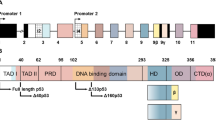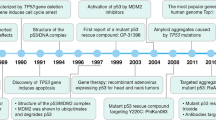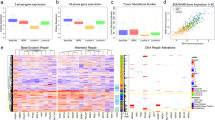Abstract
In addition to the tumor suppressor p53 protein, also termed p53α, the TP53 gene produces p53β and p53γ through alternative splicing of exons 9β and 9γ located within TP53 intron 9. Here we report that both TG003, a specific inhibitor of Cdc2-like kinases (Clk) that regulates the alternative splicing pre-mRNA pathway, and knockdown of SFRS1 increase expression of endogenous p53β and p53γ at mRNA and protein levels. Development of a TP53 intron 9 minigene shows that TG003 treatment and knockdown of SFRS1 promote inclusion of TP53 exons 9β/9γ. In a series of 85 primary breast tumors, a significant association was observed between expression of SFRS1 and α variant, supporting our experimental data. Using siRNA specifically targeting exons 9β/9γ, we demonstrate that cell growth can be driven by modulating p53β and p53γ expression in an opposite manner, depending on the cellular context. In MCF7 cells, p53β and p53γ promote apoptosis, thus inhibiting cell growth. By transient transfection, we show that p53β enhanced p53α transcriptional activity on the p21 and Bax promoters, while p53γ increased p53α transcriptional activity on the Bax promoter only. Moreover, p53β and p53γ co-immunoprecipitate with p53α only in the presence of p53-responsive promoter. Interestingly, although p53β and p53γ promote apoptosis in MCF7 cells, p53β and p53γ maintain cell growth in response to TG003 in a p53α-dependent manner. The dual activities of p53β and p53γ isoforms observed in non-treated and TG003-treated cells may result from the impact of TG003 on both expression and activities of p53 isoforms. Overall, our data suggest that p53β and p53γ regulate cellular response to modulation of alternative splicing pre-mRNA pathway by a small drug inhibitor. The development of novel drugs targeting alternative splicing process could be used as a novel therapeutic approach in human cancers.
Similar content being viewed by others
Log in or create a free account to read this content
Gain free access to this article, as well as selected content from this journal and more on nature.com
or
Abbreviations
- SR:
-
serine/arginine-rich protein
- Clk:
-
Cdc2-like kinase
- siCT:
-
non-relevant siRNA
References
Pan Q, Shai O, Lee LJ, Frey BJ, Blencowe BJ . Deep surveying of alternative splicing complexity in the human transcriptome by high-throughput sequencing. Nat Genet 2008; 40: 1413–1415.
Wang ET, Sandberg R, Luo S, Khrebtukova I, Zhang L, Mayr C et al. Alternative isoform regulation in human tissue transcriptomes. Nature 2008; 456: 470–476.
Bourdon JC, Fernandes K, Murray-Zmijewski F, Liu G, Diot A, Xirodimas DP et al. p53 isoforms can regulate p53 transcriptional activity. Genes Dev 2005; Vol. 19: 2122–2137.
Marcel V, Dichtel-Danjoy ML, Sagne C, Hafsi H, Ma D, Ortiz-Cuaran S et al. Biological functions of p53 isoforms through evolution: lessons from animal and cellular models. Cell Death Differ 18: 1815–1824 2011.
Lane D, Levine A . p53 Research: the past thirty years and the next thirty years. Cold Spring Harb Perspect Biol 2010; 2: a000893.
Fujita K, Mondal AM, Horikawa I, Nguyen GH, Kumamoto K, Sohn JJ et al. p53 isoforms Delta133p53 and p53beta are endogenous regulators of replicative cellular senescence. Nat Cell Biol 2009; 11: 1135–1142.
Bourdon JC, Khoury MP, Diot A, Baker L, Fernandes K, Aoubala M et al. p53 mutant breast cancer patients expressing p53gamma have as good a prognosis as wild-type p53 breast cancer patients. Breast Cancer Res 2011; 13: R7.
Camus S, Ménendez S, Fernandes K, Kua N, Liu G, Xirodimas DP et al. The p53 isoforms are differentially modified by Mdm2. Cell Cycle 2012; 11: 1646–1655.
Tang Y, Horikawa I, Ajiro M, Robles AI, Fujita K, Mondal AM et al. Downregulation of splicing factor SRSF3 induces p53beta, an alternatively spliced isoform of p53 that promotes cellular senescence. Oncogene 2012; 32: 2792–2798.
Mermoud JE, Cohen PT, Lamond AI . Regulation of mammalian spliceosome assembly by a protein phosphorylation mechanism. EMBO J 1994; 13: 5679–5688.
Ghosh G, Adams JA . Phosphorylation mechanism and structure of serine-arginine protein kinases. FEBS J 2011; 278: 587–597.
Muraki M, Ohkawara B, Hosoya T, Onogi H, Koizumi J, Koizumi T et al. Manipulation of alternative splicing by a newly developed inhibitor of Clks. J Biol Chem 2004; 279: 24246–24254.
Nishida A, Kataoka N, Takeshima Y, Yagi M, Awano H, Ota M et al. Chemical treatment enhances skipping of a mutated exon in the dystrophin gene. Nat Commun 2011; 2: 308.
Allende-Vega N, Dayal S, Agarwala U, Sparks A, Bourdon JC, Saville MK . p53 is activated in response to disruption of the pre-mRNA splicing machinery. Oncogene 2012; 32: 1–14.
Marcel V, Petit I, Murray-Zmijewski F, Goullet de Rugy T, Fernandes K, Meuray V et al. Diverse p63 and p73 isoforms regulate Delta133p53 expression through modulation of the internal TP53 promoter activity. Cell Death Differ 2011; 19: 816–826.
Marcel V et alin p53 protocols (3rd edn.) Vol. 962 Methods in Molecular Biology (ed Deb S and Deb SP) Ch. 2, (Spriner Science and Buisness Media New York, 2012).
Khoury MP et alin p53 protocols (3rd edn.) Vol. 962 Methods in Molecular Biology (ed Deb S and Deb SP) Ch. 1, (Springer Science and Buisness Media New York, 2012).
Cowill K, Pawson T, Andrews B, Prasad J, Manley JL, Bell JC et al. The Clk/Sty protein kinase phosphorylates SR splicing factors and regulates their intranuclear distribution. EMBO J 1996; 15: 265–275.
Gartel AL, Tyner AL . The role of the cyclin-dependent kinase inhibitor p21 in apoptosis. Mol Cancer Ther 2002; 1: 639–649.
Zhang Z, Krainer AR . Involvement of SR proteins in mRNA surveillance. Mol Cell 2004; 16: 597–607.
Sun S, Zhang Z, Sinha R, Karni R, Krainer AR . SF2/ASF autoregulation involves multiple layers of post-transcriptional and translational control. Nat Struct Mol Biol 2010; 17: 306–312.
Silden E, Hjelle SM, Wergeland L, Sulen A, Andresen V, Bourdon JC et al. Expression of TP53 isoforms p53beta or p53gamma enhances chemosensitivity in TP53(null) cell lines. PLoS One 2013; 8: e56276.
Livak KJ, Schmittgen TD . Analysis of relative gene expression data using real-time quantitative PCR and the 2(−Delta Delta C(T)) Method. Methods 2001; 25: 402–408.
Acknowledgements
We thank Valérie Meuray and Nadine Schmidt for technical support. VM and KF were supported by Breast Cancer Campaign (grant number: 2010NovPR50); OT was supported by Cancer Research UK. J-CB is a fellow of Breast Cancer Campaign (grant number: 2012MaySF127). This project was founded by Cancer Research UK (grant number: C8/A6613) to DPL and J-CB, and by Breast Cancer Campaign (grant number: 2010NovPR50) to J-CB.
Author information
Authors and Affiliations
Corresponding authors
Ethics declarations
Competing interests
The authors declare no conflict of interest.
Additional information
Edited by G Melino
Author contributions
VM, KF and OT designed the experiments; VM and J-CB supervised the project; VM, KF and OT conducted the experiments; VM and J-CB performed the data analysis; VM wrote the first draft of the manuscript; VM, OT, DPL and J-CB wrote the manuscript.
Supplementary Information accompanies this paper on Cell Death and Differentiation website
Supplementary information
Rights and permissions
About this article
Cite this article
Marcel, V., Fernandes, K., Terrier, O. et al. Modulation of p53β and p53γ expression by regulating the alternative splicing of TP53 gene modifies cellular response. Cell Death Differ 21, 1377–1387 (2014). https://doi.org/10.1038/cdd.2014.73
Received:
Revised:
Accepted:
Published:
Issue date:
DOI: https://doi.org/10.1038/cdd.2014.73
This article is cited by
-
It is not all about the alpha: elevated expression of p53β variants is associated with lower probability of survival in a retrospective melanoma cohort
Cancer Cell International (2023)
-
Nonsense-mediated mRNA decay inhibition synergizes with MDM2 inhibition to suppress TP53 wild-type cancer cells in p53 isoform-dependent manner
Cell Death Discovery (2022)
-
High expression of the p53 isoform γ is associated with reduced progression-free survival in uterine serous carcinoma
BMC Cancer (2018)
-
Splicing isoform-specific functional genomic in cancer cells
Applied Cancer Research (2018)
-
Identification of nonsense-mediated mRNA decay pathway as a critical regulator of p53 isoform β
Scientific Reports (2017)



